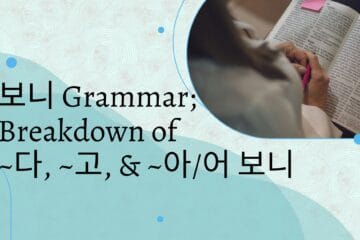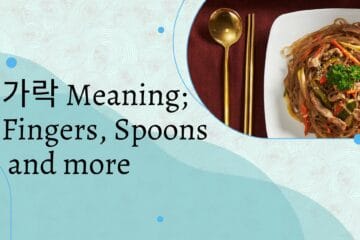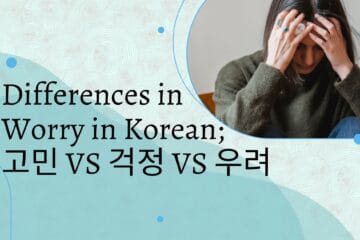Today’s grammar lesson is a quick one. We’ll be getting into how to quote people, making sentences to use “they said” in Korean.

Situations to Use ~다고 하다
Yes, it is useful when quoting someone, but also when expressing a thought, belief, promise, and more, whether it’s your own or someone else’s. Here’s a quick overview of some other uses:
- Quoting speech – 말해
저는 이미 밥을 먹었다고 말했어요: I said I already ate - Thinking – 생각
저는 이 책이 진짜 재미있다고 생각해요!: I think this book is really interesting! - Believing – 믿다
잘할 수 있을 거라고 믿어요: I believe you can do well - Promise – 약속하다
그는 나중에 공부하겠다고 약속했어요: he promised to study later - Call something – 부르다
이 꽃을 장미라고 불러요: we call this flower a rose - Questions
뭐라고요?: what did you say?
아빠가 뭐라고 말할 거예요?: what will dad say?
When to Use ~다고 하다 and ~라고 하다
You might have seen ~라고 하다 as well used for said in Korean. The use case for this is easy to understand, so here is a simple breakdown:
- ~ㄴ/는다고 하다: used for verbs
- ~다고 하다: used for adjectives
- ~라고 하다: used with nouns in the present tense
- ~이었/였다고 하다 is used for nouns in the past tense!
Using 다고 하다 in the Present, Past, and Future Tense
You’ll have to add in ~는 or ~ㄴ for verbs using this grammar structure. The rule follows if a word ends in a vowel or a consonant. So 가다 changes into 간다, meanwhile 먹다 changes to 먹는다. Adjectives are simple because they don’t change; you only have to add ~다고 하다 to the stem. And finally, for nouns, you need to use ~(이)라고 하다.
Future Tense:
Verbs:
- 저는 다음 주에 여행을 가겠다고 했어요. I said I’m going to travel next week
Adjectives:
- 엄마가 음식이 맛있을 겠다고 했어요: Mom said the food will be delicious
Nouns:
- 친구는 성공할 것이라고 생각해요: I think my friend will succeed
Present Tense:
Verbs:
- 뉴스에서 내일 비가 온다고 했어요: the news says it’ll rain tomorrow
Adjectives:
- 모두가 이 영화가 재미있다고 했어요. everyone said this movie is fun
- 선생님이 숙제가 많다고 하셨어요: the teacher said there is a lot of homework
Nouns:
- 지민 씨가 학생이라고 했어요: Jimin said they’re a student
- 그 사람은 의사라고 해요: he says he is a doctor
Past Tense:
Verbs:
- 그는 늦게 점심을 먹었다고 했어요: he said he had lunch late
- 제 친구는 지난 겨울 한국의 날씨가 추웠다고 했어요: my friend said it was cold in Korea last winter
Nouns:
- 그는 선생님이었다고 했어요. He said he was a teacher
Remember to use ~이었/였다고 하다 for nouns in the past tense!
Key Learner Phrases!
For a beginner, 뭐라고 is a key to communication! Native Koreans can speak fast, use complex words or phrases, have an unfamiliar accent, and all sorts of combinations that can make understanding hard. With this simple word, you can clarify naturally while staying in Korean.
뭐라고요?: what did you say?
죄송합니다, 뭐라고 하셨어요?: sorry, what did you say?
그 사람이 뭐라고 했어? what did they say?
And you can pair them with certain phrases to help you/explain your situation, such as:
여기 너무 시끄러워가지고: it’s so loud in here
한번 다시 말해줘: would you say it one more time?
천천히 다시 말해 주세요: please say it again slowly



2 Comments
Rosina · August 31, 2025 at 6:35 pm
Your blog has quickly become one of my favorites. Your writing is both insightful and thought-provoking, and I always come away from your posts feeling inspired. Keep up the phenomenal work!
Pam · September 1, 2025 at 1:52 am
I’m so glad to hear that, Rosina! Thank you for that it means a lot, I wish you luck in your Korean learning journey!